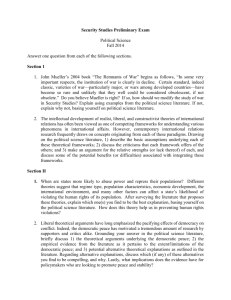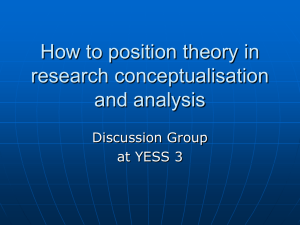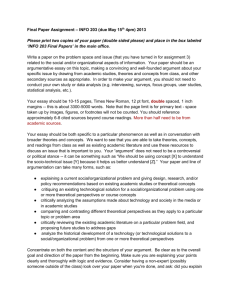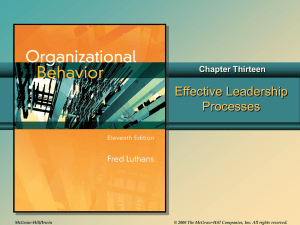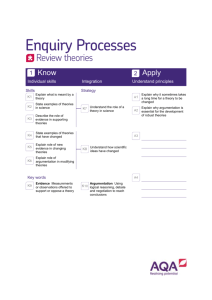Tribhuvan University - Institute of International Relations University
advertisement
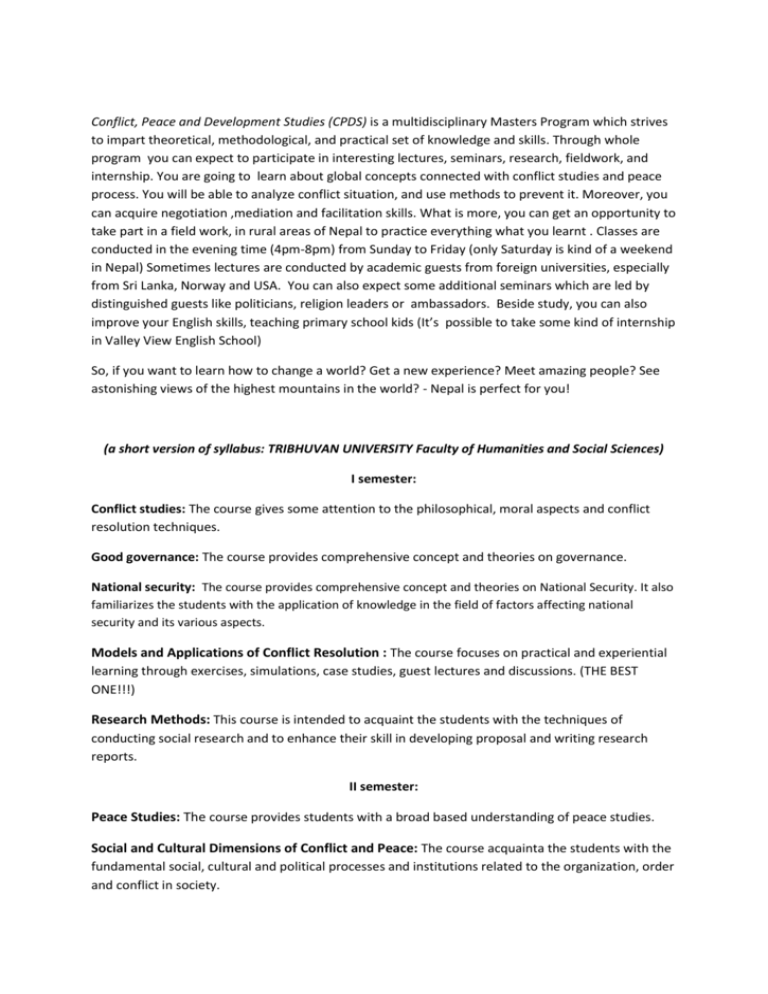
Conflict, Peace and Development Studies (CPDS) is a multidisciplinary Masters Program which strives to impart theoretical, methodological, and practical set of knowledge and skills. Through whole program you can expect to participate in interesting lectures, seminars, research, fieldwork, and internship. You are going to learn about global concepts connected with conflict studies and peace process. You will be able to analyze conflict situation, and use methods to prevent it. Moreover, you can acquire negotiation ,mediation and facilitation skills. What is more, you can get an opportunity to take part in a field work, in rural areas of Nepal to practice everything what you learnt . Classes are conducted in the evening time (4pm-8pm) from Sunday to Friday (only Saturday is kind of a weekend in Nepal) Sometimes lectures are conducted by academic guests from foreign universities, especially from Sri Lanka, Norway and USA. You can also expect some additional seminars which are led by distinguished guests like politicians, religion leaders or ambassadors. Beside study, you can also improve your English skills, teaching primary school kids (It’s possible to take some kind of internship in Valley View English School) So, if you want to learn how to change a world? Get a new experience? Meet amazing people? See astonishing views of the highest mountains in the world? - Nepal is perfect for you! (a short version of syllabus: TRIBHUVAN UNIVERSITY Faculty of Humanities and Social Sciences) I semester: Conflict studies: The course gives some attention to the philosophical, moral aspects and conflict resolution techniques. Good governance: The course provides comprehensive concept and theories on governance. National security: The course provides comprehensive concept and theories on National Security. It also familiarizes the students with the application of knowledge in the field of factors affecting national security and its various aspects. Models and Applications of Conflict Resolution : The course focuses on practical and experiential learning through exercises, simulations, case studies, guest lectures and discussions. (THE BEST ONE!!!) Research Methods: This course is intended to acquaint the students with the techniques of conducting social research and to enhance their skill in developing proposal and writing research reports. II semester: Peace Studies: The course provides students with a broad based understanding of peace studies. Social and Cultural Dimensions of Conflict and Peace: The course acquainta the students with the fundamental social, cultural and political processes and institutions related to the organization, order and conflict in society. Gender, Conflict and Development: The course familiarizes students with basic conceptual, theoretical and methodological aspects and contemporary issues of gender studies. Moreover, it equips students with knowledge of gender dimension of conflict, peace and development. Studies in International Human Rights and Humanitarian Law: This course provides a theoretical and historical introduction to International Human Rights and Humanitarian Law Law. Students should be able critically analyze the theories and relate it to the contemporary practices in human rights and humanitarian law. Research Practicum, Field-Work and Report Writing: This course provides practical skills and experience to the students with regard to carrying out research on topics and issues relevant to Conflict Peace and Development Studies. It will be devoted to impart hands-on skills on HOW to undertake a field research and produce a paper on the basis of empirical data/information. Part Iinteractive sessions held in the classroom. Students will prepare a mini research project, design the study, tools and techniques for data collection, etc. Part II - a field-work (10-12 days) wherein the students will collect data/information on the basis of the tools and instruments prepared during Part I of the course-work. III semster Development Studies: This course examines the relationships between conflict and development and consider strategies that can address their interplay in a variety of settings, both before violence breaks out across social fault lines, and after. Natural Resource Conflict: This course familiarizes the students with various conceptual and theoretical perspectives to interpret conflict over/due to natural resources. It enables to identify how conflicts arise in relation to various types of natural resources (e.g. in land, forest, water, minerals, etc.); and enables to understand international dimensions of resource conflict (such as in transboundary water resource, climate change, etc.). Psychology and Personal Transformation: This course provides fundamental concepts, theory and application of psychology in understanding conflict, its source, psychosocial consequences and reduction of it through the introductory and practical insights of the science-based knowledge combined with various wisdom traditions relevant for personal transformation and art of peaceful living. International Relations: This course introduces key ideas and debates in the field of international relations. Students will be familiarized with Levels-of-Analysis and several leading IR theories including neo-liberalism, neo-realism, and strategic choice. Concentrated on political, military relations among states, international political economy and the politics of global welfare. Power and Politics: The course familiarizes the students with the foundational issues of political power and authority and its linkages with governance, development, and conflict. Transitional Justice and Reconciliation: The course builds a theoretical and practical understanding of the role of 'transitional justice', and the underlying relationship between justice and peace. It examines the role of the international and domestic legal systems and institutions in facilitating transition. It makes links between the experience of Nepal and other international and comparative contexts and pursues research agenda through theoretical and empirical work that seeks to transform and develop the theory and practice of transitional justice. Violence and Human Security: This course provides comprehensive knowledge, concepts and theories on violence and human security. It also familiarizes the students in the application of knowledge in the field of human security. IV semester Migration, Refugee and Conflict: This course acquaints with the discourse of migration, refuge and displacement. It focuses on the enhancement of knowledge and techniques by analyzing conflicts related to migration, refugee and displacement around the globe. The course also highlights the consequences of migration, refugee and displacement conflicts, and roles and responses of different international agencies to mitigate the problems. Economics of Conflict: The course introduces economic causes and impacts of conflict, and measure the costs of conflict, identify post-conflict economic issues and its management, and examine lessons derived from conflict from selected countries. Peace-Tourism and Development: The course provides extensive knowledge about humans‘ movement, interaction, intercultural communication, understanding, goodwill and peace between the people of different countries on one side and tourism is as developmental tool during the peace time on the other. Peace and Disarmament Education: This course provides knowledge on dialogue on disarmament, non-proliferation and security matters by informing about global disarmament and non-proliferation norms and region-oriented approach to translating global disarmament and non-proliferation norms in Asia and around the world. Comparative Constitutions: The course imparts the knowledge about Constitution and Constitutionalism. It explains general features of different models of Constitutions. It enhances students' capacity for evaluating the role of different organs of government. International Organizations: The overall objectives of the course: to delineate the historical antecedents and trends in the growth of international organizations; to identify the various types of international and transnational organizations and discuss the important characteristics of each; to discuss the various theories and concepts used to study international organizations; to describe the structure and activities of the principal organs and specialized agencies of the UN system.
